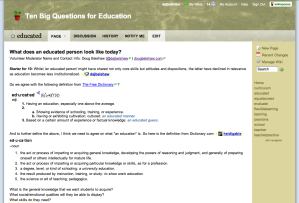Education: it’s what you can’t see that counts.
I had a great, wide-ranging discussion last night with Bud Hunt (@budtheteacher), Audrey Watters (@audreywatters) and Steve Hargadon (@stevehargadon) after the second day of the DML Conference 2012. Much of it focused on the role of technology in educational reform with much of it sparked by an excellent keynote panel of which Connie Yowell (MacArthur Foundation) was the star.
To me, the whole problem with educational reform is that what matters can’t be seen or touched. It’s physically intangible.
What do we tend to do? We focus on the things that we can see. As Bud pointed out, teachers in his district will sometimes point to discrepancies in access to technology as being a limiting factor on their performance. Others look at the material conditions of one learning environment and attribute ‘success’ to these easily-observed factors.
We should be used to this by now. Living in a world of networks (and networks of networks) we know that it’s the invisible bonds, the weak ties, that connect us to people and ideas. As Connie Yowell pointed out it’s this kind of innovation that scales. Audrey Watters extended this point when she commented that technology scales vertically, whereas people scale horizontally.
So what can we do about this? The first thing we need to do, I’d suggest, is to surface processes and networks. These both need to be as open and inclusive as possible and we need ways to talk about them to make them more tangible.
Any suggestions? I’d love to hear them in the comments.



